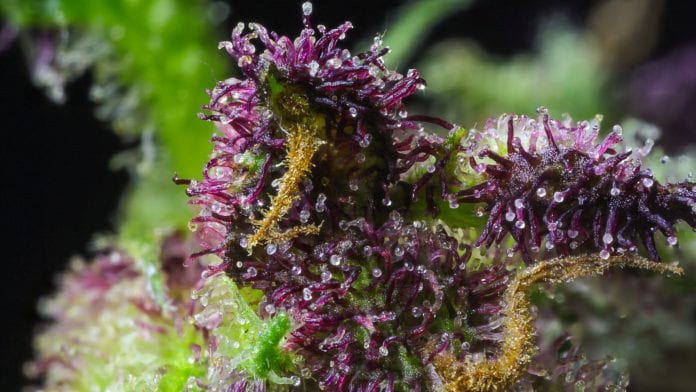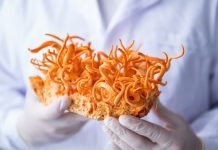
A recent study has concluded that a non-cannabinoid, non-psychoactive cannabis flavonoid, FBL-03G, has the potential to treat pancreatic cancer.
The study, conducted by researchers with Dana Farber Cancer Institute and Harvard Medical School, used animal models to look at the impact of FBL-03G – a flavonoid derived from Cannabis sativa L. – on the progression of tumours. It demonstrated the therapeutic efficacy in both local and metastatic tumour progression in animals with pancreatic cancer.
Using a combination treatment of cannabis flavonoid FBL-03G as an immunoadjuvant, in vitro studies were first carried out with and without radiotherapy (RT), with the flavonoid being sustainably delivered from smart radiotherapy biomaterials.
Currently, the survival rate for advanced pancreatic cancers is an average of five years, with current treatment including options such as chemotherapy, radiation and immunotherapy, and surgery – all of which have limited success due to the cancer’s aggressive nature.
What is a cannabis flavonoid?
Flavonoids are secondary metabolites found in plants and fungus – and ones found only in cannabis are known as cannaflavins. These give the plant colour to attract pollinators, work in conjunction with terpenes to give the plant its’ taste and aroma and protect the plant from pests and diseases.
Although flavonoids are widely understudied, we are learning more about them as more research is conducted. A number of recent studies have revealed many pharmacological benefits to the flavonoids found specifically in the cannabis plant.
Therapeutic efficacy
The study, published in Frontiers in Oncology, conducted repeated experiments that showed significant increases in the survival rate for animals with pancreatic cancer compared to control groups.
The study stated: ‘While ongoing studies are in progress to address the specific mechanism for this immunotherapy potential of this cannabis derivative, the possibility of leveraging such a therapy approach to treat metastasis or increase survival is significant, given that most pancreatic cancer patients are diagnosed already with metastatic disease, with limited treatment options.
‘The results highlight the potential of using non-cannabinoid, non-psychoactive derivatives of cannabis for such treatment. Further work to optimise therapeutic efficacy for such cannabis derivatives and evaluate toxicity could set the stage for clinical translation.
‘The FBL-03G results reveal a new potential non-cannabinoid cannabis derivative with major potential for consideration in further investigations in the treatment of pancreatic cancer, where new therapy options are urgently needed.’
Inhibited tumour growth in other parts of the body
The researchers were surprised at some of the unprecedented findings in the study that demonstrated the cannabis flavonoid also inhibited tumour progression in other parts of the body that the cancer had spread to.
The study administered sustained delivery of the cannabis flavonoid derivative FBL-03G from smart radiotherapy biomaterials (SRBs) which resulted in tumour growth inhibition of both locally treated and distant untreated tumours, with and without radiotherapy.
The study noted: ‘The FBL-03G payload used in this study is a flavonoid non-cannabinoid derivative of cannabis, and the potential to inhibit both local and metastatic tumour progression is remarkable, especially for pancreatic cancer, with a dismal five-year survival rate of 8%.’




















Are there any clinical trials for patients to use this FBL-03G ?
I’d love to know if there are any trials too, my friend has pancreatic cancer.
I’d be interested of any trials or further research as my mum has just been diagnosed
Same here! I was diagnosed on August 20th 2017 and after two attempts at Whipple surgery the tumour was declared inoperable. Various organs were partly or wholly removed to prevent spread, including part of the pancreas and stomach. Since then I have undergone a clinical trial of chemotherapy (Gemcitabine and Abraxane) and radiotherapy, ending May 11th 2018, but am looking for any chance of killing the tumour. A clinical trial of this, through my existing oncology consultant, would be welcome, but how and where?
Does anyone know which strains of cannabis (it mentions sativa – more details?) contain this flavonoid? Someone close to me was just diagnosed this week.
all strains work. my mom cured her lung cancer with cannabis oil.
I was diagnosed in July, 2017, had radiation and chemo, the Whipple surgery July 24, 2018, had chemo again, after 9 months tumors came back in a different area of the pancreas. Restarted chemo, September, 2019 to present. Just received CT scans which now show the tumors have started back growing. Looking for a clinical trial.
I just found this article today as it was shared on Linkedin… Interesting read. It’s almost one and a half year since this one was published and I wonder if there is any progress regarding this topic?
Nevertheless, cannabis is the future.
I have had breast cancer twice and have gradually had parts of me cut away, for over 20 years, I find it abhorrent that in England X prime-minister Teresa Mays husband has grown it for years sending oil to Canada when it’s illegal to grow ourselves or buy it. When will this change
I’d like more infos ASAP please